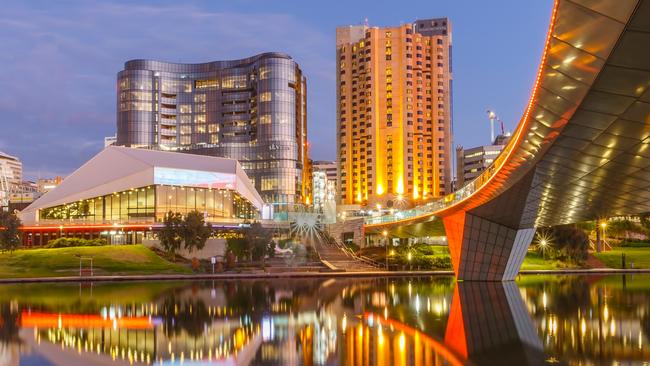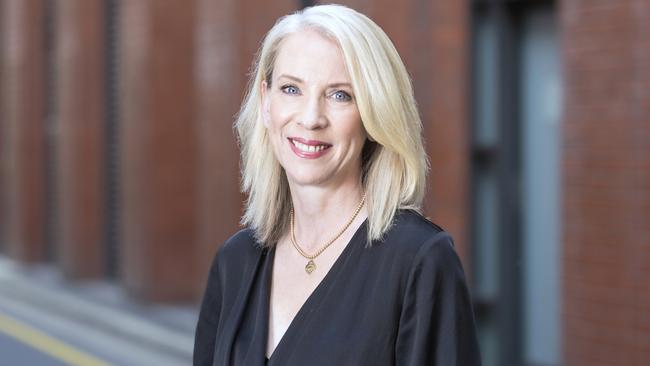Bernard Salt compares Adelaide CBD to a giant fried egg at AEDA business summit
In an unusual pitch to attract office workers back to the city, top demographer Bernard Salt has compared Adelaide to being “like a giant fried egg”. Here’s why.
SA News
Don't miss out on the headlines from SA News. Followed categories will be added to My News.
Adelaide is like a giant fried egg with the CBD its yellow yolk and the suburbs its white, according to a well-known social commentator.
Melbourne-based demographer Bernald Salt told a business summit that South Australians needed to be “outrageously aspirational” as the state emerged into a post-Covid 19 world.
Mr Salt said Adelaide needed to accept flexible working arrangements introduced during the pandemic meant working from home would become permanent.
Instead of looking at the CBD as a place where workers commuted each day and “spent their days in cubicles”, the city needed to embrace change and create a permanent “buzz”.
“I think we need to be very, very positive, very aspirational, in fact outrageously aspirational for our CBDs,” said Mr Salt.
“(The CBD) is going to be a very celebratory space in the future.
“We should be getting behind the CBD and projecting it forward.”

Mr Salt, who attracted national attention for saying Millennials were unable to enter the housing market because they were too busy spending money on smashed avocado, compared Adelaide to a fried egg.
“Adelaide is like a big fried egg with a rich, creamy yolk in the centre (the CBD),” he said.
“It is a jewel in crown, it offers something different to suburbia, the flat white of suburbia.”
Mr Salt said it was vital for the CBD to create energy through festivals and other events to entice people who lived – and largely worked – in the suburbs.
“Life in the CBD in 2027 will be very different to 2019 (when Covid-19 first emerged in China),” he said.
“We lived in the suburbs and commuted, rolled into work and sat in a cubicle.
“Now workers will have city days and home days. spend their days at home writing reports and doing analysis and so on, the pool room will be the zoom room.
“Days in the office will be spent with IT people, doing training ordered by HR, collaborating with colleagues, meeting contacts over coffee and celebrating with lunches and dinners.”

Mr Salt said South Australians needed to embrace the opportunities presented by the changed working arrangements.
“Now is the time to be aspirational and unbridled in your ambitions for what you want for you city, your CBD, your state,” he said.
“You are not going back to the past but imagining a better version of Adelaide and the CBD in the future.”
Half of Adelaide’s workers to be back full-time by end of year
The inaugural Adelaide Economic Development Authority (AEDA) business summit heard a survey found more than half of city workers expected to be back in the Adelaide CBD full-time by the end of the year.
Recent research commissioned by Adelaide City Council found two thirds of employees would be encouraged to return to their city offices within the next three months.
This included federal and state public servants, employees of large multinational corporations and the office staff of major Australian-owned businesses.

Council chief executive Clare Mockler revealed more than 800 city workers and 40 large employers with CBD offices had been asked about working from home arrangements.
Ms Mockler told the summit the survey last month by McGregor Tan found 54 per cent of CBD workers expected to be back in the city full-time by December, the remainder believed they would be spending at least three days a week working in the office and two days at home.
“(According to the research) employees are dictating the terms when it comes to working from home arrangements – this is now considered an entitlement,” she said.
“We know working from home is here to stay.”
Ms Mockler said the council had spent $20m on trying to reactivate the CBD – and encourage the return of office workers – following a severe economic downturn during the pandemic.
“Business leaders we surveyed acknowledged the investment of council to activate the city, making it safe and appealing for them to return to work,” she said.
“These business leaders acknowledged that they share the responsibility for encouraging workers back to city premises.”
Speaking at the AEDA business summit, Ms Mockler said there were “hopeful signs that our city is bouncing back”.
This included total spending of $350m within the CBD during March, compared to $210m in January at the height of the Omicron outbreak.
Ms Mockler said the outbreak was “devastating” for city businesses.
“Foot traffic across the city is now higher than it was at the end of last year, and office occupancy is the highest in the country,” she said.
“Our spending and mobility results that track expenditure and residential vacancy rates provide positive proof of growing customer and investor confidence.”





